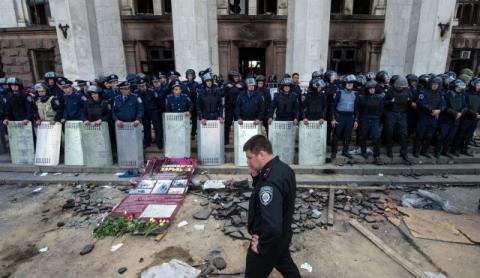Putin got just the war he asked for
For once at least, the statement by Russian President Vladimir Putin's spokesman can be taken at value when Dmitry Peskov said Saturday that Russia has "essentially lost influence over these people." Especially since for the first time the statement included the implicit admission that Russia had influence on them to begin with. Russia has been accusing Kiev for over a week that it is provoking "civil war" and this weekend, with the fire in Odessa, gunfights in Slaviansk and Kramatorsk which added dozens of casualties to the growing death-toll and the shooting-down of two Ukrainian attack helicopters, a civil war is exactly what they got.
Even if this wasn't Russia's intention, the propaganda has fulfilled itself. Not that it should surprise anyone that encouraging local pro-Russian groups, reinforced by "volunteers" from Russia and the Moldovan breakaway province of Transnistria, to take on the security forces and occupy government buildings, would lead to chaos. Especially when taking into account the fact that Ukraine's police and military forces can hardly be relied upon to obey orders from Kiev. Just as the Odessa police stood by during the early stages of the battle around the Worker's Union building, contributing to the horrific result.
But even if the Russians have lost control of events, they haven't retreated from their main objective: denying any possibility of a pro-Western government taking power in Kiev for long. The most recent official statements from Moscow emphasized that the Ukrainian presidential elections, scheduled to take place in three weeks, must not be held due to the current situation in the east.
While this obviously ignores Russia's contribution to the breakdown in law and order, it's clear that Putin now believes there is little chance of a more Moscow-friendly president emerging from these elections. He would therefore prefer to undermine the polls' legitimacy even before they open, and if possible, prevent them in advance.
The Western leaders who have slowly and gradually come to terms with Russia's actions, belatedly reinforced NATO forces based in member-nations of the alliance bordering with Russia and Ukraine and ramped-up sanctions (while still holding back from sanctions directed at key economic sectors). They now realize that the battle in the next few weeks will be over the elections and their legitimacy.
From that aspect, the meeting and joint press conference of U.S. President Barack Obama and German Chancellor Angela Merkel on Friday in Washington was significant. Relations between the two countries went through a rough patch last year following revelations of U.S. surveillance operations against Germany leaked by former NSA employee Edward Snowden, now living in asylum in Moscow.
The fact that Chancellor Merkel stood beside Obama at the White House, echoing his threats of further sanctions against Russia if the May 25 elections do not go ahead is a new signal that the two western governments with the most levers of pressure on Russia have now formed a unified front.
Anshel Pfeffer

